2017 to 2018 Annual Report on Government of Canada Advertising Activities
The 16th edition of the Annual report on Government of Canada advertising activities consists of information on Government of Canada advertising expenditures, new processes in place for the management of advertising activities, major campaigns and results from select campaigns.
In accordance with the Policy on Communications and Federal Identity, Public Services and Procurement Canada produces the annual report on Government of Canada advertising activities. All figures are exclusive of tax and apply to government institutions included in Schedule I, Schedule I.1 and Schedule II of the Financial Administration Act.
View and download previous annual reports on advertising activities on the Government of Canada publications website.
Published by Public Services and Procurement Canada, 2019
This publication may be reproduced for non-commercial purposes only. Prior written permission must be obtained from Public Services and Procurement Canada (PSPC) for all other use.
- Catalogue Number:
- P100-2E-PDF
- International Standard Serial Number (ISSN):
- 1925-8887
On this page
- A year of innovation
- The award winning campaigns
- Advertising expenditures
- Advertising for results: Spotlight on 3 campaigns
- Official languages
- English and French spending: Share of spending by media type
- Reaching all Canadians
- Ethnic and Indigenous languages
- International media spending
- Government of Canada advertising expenditures
- Advertising expenditures by institution
- Major campaigns by institution exceeding $500,000
- Appendices
A year of innovation
Innovation featured prominently in Government of Canada advertising in 2017 to 2018. With the steady increase in the use of digital media—because Canadians are using more digital platforms with digital frequency… and therefore expect their government to communicate with them on those channels—departments challenged their creative agencies and the Agency of Record to “spread their creative wings.”
The result. Four government campaigns were recognized at the Prix Média Infopresse, an event organized by InfoPresse in collaboration with the Media Directors’ Council of Quebec. This annual event, which has been held since 1995, celebrates the best in media strategy and innovation.
The 4 government campaigns were acknowledged for their use of innovative digital media.
Innovation also found its way into how the government communicates with members of Canada’s official language minority communities. A pilot project on the usefulness of a “bilingual toggle” on digital display ads concluded successfully. It demonstrated that Canadians would, and did, “toggle” to advertisements in the official language they preferred, regardless of what language the ads were delivered to them on their desktops or mobile devices.
Government of Canada advertising is defined as any message conveyed in Canada or abroad and paid for by the government for placement in media, including but not limited to newspapers, television, radio, cinema, billboards and other out-of-home media, mobile devices, the internet and any other digital mediums.
The award winning campaigns
National Defence campaign: Recruitment

Description of National Defence campaign: Recruitment
National Defence’s recruitment campaign wanted to reach young people who may not have considered a military career. What better way to see themselves as a member of the Canadian Armed Forces, than to try on the uniforms.
The campaign used multiple platforms, but the award winning tactic was the use of Snapchat. A unique Snapchat filter allowed users to put themselves into the helmets and uniforms of the 4 different branches of the Canadian Armed Forces to see which uniform suited them best. The results were remarkable! The filter generated 4.5 million impressions and reached more than 2 million users in 1 day. Mean interaction time and utilization rate were 30% and 17% above industry average, respectively.
In addition, a study was conducted to assess Canadians’ changing views of career choices and a 48% increase in positive perception was recorded among the millennial target audience when asked if they would consider a career in the Canadian Armed Forces. The campaign succeeded in improving the reputation of the Canadian Armed Forces with the target group in an innovative and surprising way.
Veterans Affairs Canada campaign: Remembrance Day

Description of Veterans Affairs Canada campaign: Remembrance Day
The Remembrance Day campaign on Twitter by Veterans Affairs Canada (VAC) encouraged Canadians to take time on November 11 to remember the sacrifices of veterans by using the hashtag #LeCanadaSeSouvient or #LestWeForget.
They also launched “retweet to remember,” a Twitter campaign encouraging people to retweet VAC’s post to receive a reminder on the November 11 to pause and remember. Those who participated were invited to include their profile picture in a Remembrance Day mosaic displayed on a big screen at Dundas Square in Toronto. More than 18,000 photos were integrated into the Twitter mosaic. Tweets using the hashtag #LeCanadaSeSouvient or #CanadaRemembers were broadcast in real time and a large poppy was displayed during the 2 minutes of silence from 11:00 to 11:02.
During the 11 days of the campaign, there were nearly 7 million impressions, the video was viewed more than 2 million times and the tweet was shared nearly 25,000 times. This is double the views received in 2016 and over 4 times the number of shares.
Public Safety Canada campaign: Drug Impaired Driving
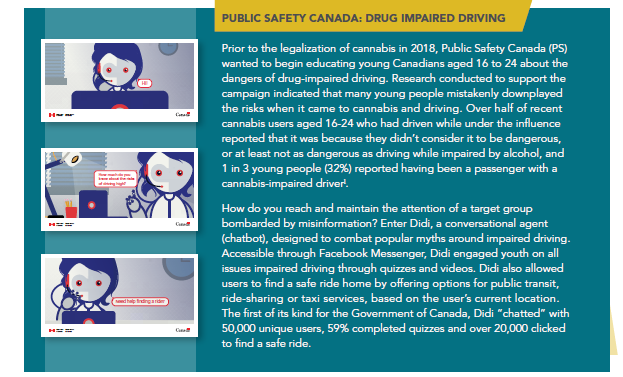
Description of Public Safety Canada campaign: Drug Impaired Driving
Prior to the legalization of cannabis in 2018, Public Safety Canada (PS) wanted to begin educating young Canadians aged 16 to 24 about the dangers of drug-impaired driving. Research conducted to support the campaign indicated that many young people mistakenly downplayed the risks when it came to cannabis and driving. Over half of recent cannabis users aged 16-24 who had driven while under the influence reported that it was because they didn’t consider it to be dangerous, or at least not as dangerous as driving while impaired by alcohol, and 1 in 3 young people (32%) reported having been a passenger with a cannabis-impaired driver Footnote 1.
How do you reach and maintain the attention of a target group bombarded by misinformation? Enter Didi, a conversational agent (chatbot), designed to combat popular myths around impaired driving. Accessible through Facebook Messenger, Didi engaged youth on all issues impaired driving through quizzes and videos. Didi also allowed users to find a safe ride home by offering options for public transit, ride-sharing or taxi services, based on the user’s current location. The first of its kind for the Government of Canada, Didi “chatted” with 50,000 unique users, 59% completed quizzes and over 20,000 clicked to find a safe ride.
Canadian Heritage campaign: Canada 150
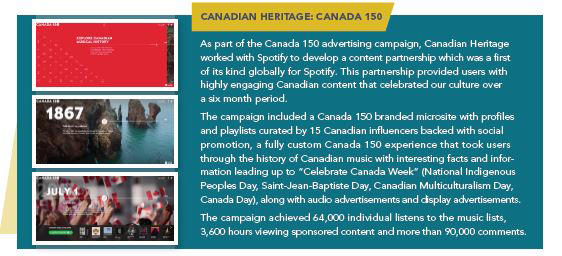
Description of Canadian Heritage campaign: Canada 150
As part of the Canada 150 advertising campaign, Canadian Heritage worked with Spotify to develop a content partnership which was a first of its kind globally for Spotify. This partnership provided users with highly engaging Canadian content that celebrated our culture over a 6 month period.
The campaign included a Canada 150 branded microsite with profiles and playlists curated by 15 Canadian influencers backed with social promotion, a fully custom Canada 150 experience that took users through the history of Canadian music with interesting facts and information leading up to “Celebrate Canada Week” (National Indigenous Peoples Day, Saint-Jean-Baptiste Day, Canadian Multiculturalism Day, Canada Day), along with audio advertisements and display advertisements.
The campaign achieved 64,000 individual listens to the music lists, 3,600 hours viewing sponsored content and more than 90,000 comments.
Advertising expenditures
In 2017 to 2018 the Government of Canada spent $39.2M on advertising. This is the second lowest amount spent in 10 years—the lowest was in the last fiscal year. Figure 1 represents the changes in advertising expenditures over the past 10 years.
Figure 1: Advertising expenditures—A 10 year perspective
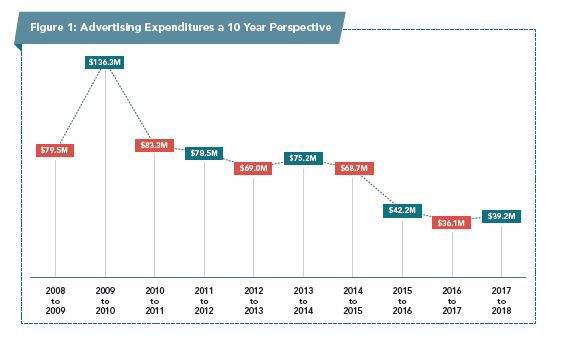
Image description of Figure 1: Advertising Expenditures—A 10 year perspective
This line chart shows the total Government of Canada advertising expenditures in millions of dollars over a 10-year period.
- 2008 to 2009: 79.5 million
- 2009 to 2010: 136.3 million
- 2010 to 2011: 83.3 million
- 2011 to 2012: 78.4 million
- 2012 to 2013: 69.0 million
- 2013 to 2014: 75.2 million
- 2014 to 2015: 68.7 million
- 2015 to 2016: 42.2 million
- 2016 to 2017: 36.1 million
- 2017 to 2018: 39.2 million
These expenditures include planning, production of advertising materials, and cost of media placements (exclusive of taxes). The majority of media is purchased through the Agency of Record (AOR). Departments can purchase directly from media outlets if the total media purchase does not exceed $25,000. Table 1 shows the breakdown of advertising using the AOR and directly purchased media amounts.
The Agency of Record (AOR): is a private sector supplier, selected through a competitive process, which plans, negotiates, consolidates, purchases and verifies advertising media space and time for government advertising.
| Types of advertising | Amount spent | Percent |
|---|---|---|
| Advertising campaigns-media purchased through the Agency of Record | 35.8M | 92% |
| Advertising campaigns-media purchased directly by institutions | 3.3M | 8% |
| Grand total | 39.2M | 100% |
Table 1 Notes
|
||
Figure 2: Agency of record media placement expenditures by type Footnote 2
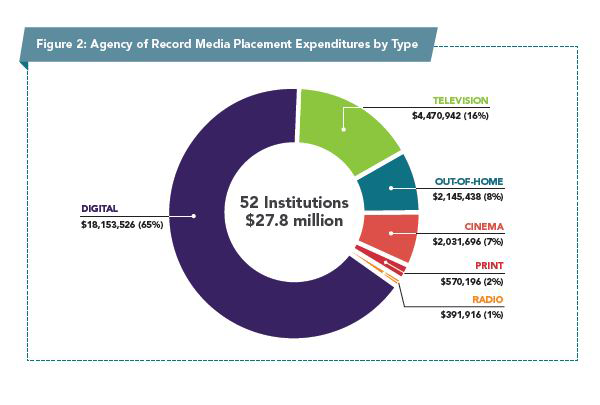
Image description of Figure 2: Agency of record media placement expenditures by type
This pie chart shows the total amount of spending on media for Government of Canada advertising and the proportions spent on 6 types of media: digital, television, out of home, cinema, print, radio.
During the fiscal year 2017 to 2018, the Government of Canada’s agency of record made media placements for 52 institutions, representing $27.8 million in expenditures.
Of the total amount spent on government media placements:
- $18,153,526 (65%) was spent on digital advertising
- $4,470,942 (16%) was spent on television
- $2,145,438 (8%) was spent on out-of-home
- $2,031,696 (7%) was spent on cinema
- $570,196 (2%) was spent on print
- $391,916 (1%) was spent on radio
Note about Figure: These numbers do not include the production expenditures or media buying fees.
Media type is chosen by institutions in order to achieve their campaign objectives by using the best channel to reach their target audiences. Their decisions are informed by research on trends and audience preferences.
Figure 3 shows the advertising media types purchased by the AOR in the past 5 years. Digital placements continued to rise in popularity, with 65% of media placements occurring on digital platforms in 2017 to 2018. There are a number of reasons for this but the primary reason is the number and range of individuals from all walks of life who use digital platforms, especially social media. Out-of-home also saw an increase in use, rising to 15% of placements.
The 3 departments that spent the most on out-of-home to promote their programs this year were: Parks Canada for its free parks passes, the Canada Revenue Agency for the Canada Caregiver Credit, and Health Canada to promote vaccination.
Media buy or placement: The purchase of advertising space and time from a media outlet, such as television, radio, digital, newspaper, magazine, website, cinema, out-of-home, etc..
Figure 3: Agency of record media expenditures by type—A 5-year perspective Footnote 3
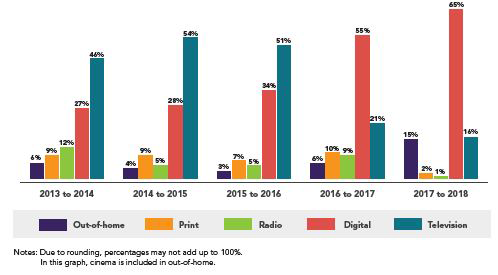
Note: Due to rounding, percentages may not add up to 100%.
In this chart Cinema is included in out-of-home.
Image description of Figure 3: Agency of record media expenditures by type—A 5-year perspective
The vertical bar chart shows the percentages of Government of Canada advertising media expenditures over 5-year period from the fiscal 2013 to 2014 to the fiscal year 2017 to 2018. The 5 types of media displayed in the graph are: Out-of-home, Print, Radio, Digital, and Television
| Fiscal year | Out-of-home | Radio | Digital | Television | |
|---|---|---|---|---|---|
| 2013 to 2014 | 6% | 9% | 12% | 27% | 46% |
| 2014 to 2015 | 4% | 9% | 5% | 28% | 54% |
| 2015 to 2016 | 3% | 7% | 5% | 34% | 51% |
| 2016 to 2017 | 6% | 10% | 9% | 55% | 21% |
| 2017 to 2018 | 15% | 2% | 1% | 65% | 16% |
When the Government of Canada updated the Policy on Communications and Federal Identity in 2016 it recognized that Canadians increasingly use technology to communicate in their daily lives, and expect to interact with the government in the same way. In order to better connect with Canadians, government organizations adopted a digital first approach, using the tools that Canadians use (social media and the Web) as the principle means of communications. This is balanced with traditional methods to reach and engage with Canadians effectively and efficiently in the official language of their choice, regardless of where they reside.
Digital remains the most commonly used media by government advertisers in 2017 to 2018, but the types of placements have shifted as shown in Figure 4. In 2013 to 2014, 79% of the digital media placements were display advertisements. In 2017 to 2018, for the first time social media was the most used digital media representing 43% of digital placements.
Digital display advertising (including YouTube): Advertising in different text, image and audio formats, such as banner or big box ads published on a website for viewing by site visitors.
Figure 4: Digital placement with agency of record—A 5-year perspective
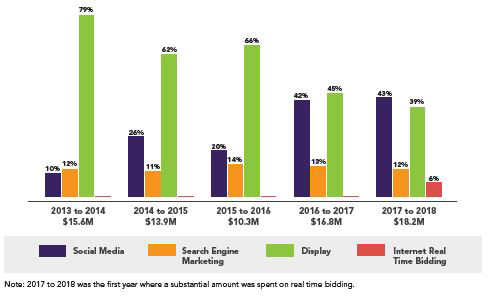
Note: 2017 to 2018 was the first year where a substantial amount was spent on real time bidding.
Image description of figure 4: Digital placement with agency of record—A 5-year perspective
The vertical bar chart shows the amount of Government of Canada advertising expenditures attributed to digital media, over a 5-year period, from the fiscal year 2013 to 2914 to the fiscal year 2017 to 2018. The Chart Displays 4 digital media categories: Social Media, Search Engine Marketing, Display, Internet Real Time Bidding.
The chart displays 3 digital media categories: Social media, Search engine marketing, Display, and Internet real time bidding.
| Fiscal year | Social media | Search engine marketing | Display | Internet real time bidding | Total digital expenditures |
|---|---|---|---|---|---|
| 2013 to 2014 | 10% | 12% | 79% | n/a | $15.6 million |
| 2014 to 2015 | 26% | 11% | 62% | n/a | $13.9 million |
| 2015 to 2016 | 20% | 14% | 66% | n/a | $10.3 million |
| 2016 to 2017 | 42% | 13% | 45% | n/a | $16.8 million |
| 2017 to 2018 | 43% | 12% | 39% | 6% | $18.2 million |
Note about chart: 2017 to 2018 was the first year where a substantial amount was spent on real time bidding.
Social media, such as Twitter, Facebook and LinkedIn, represents the largest part of digital advertising placements this year. Figure 5 shows the use of these 3 platforms over the past 5 years. As of the fourth quarter of 2016, Facebook had a 75 percent reach among Canadian internet users, equal to YouTube’s reach, and twice as high as that of Twitter’s Footnote 4. Further, Facebook allows for niche-targeting and it generally has high engagement rates. Twitter, on the other hand, is used more for “breaking news” and has more limited targeting options.
Social media: Interactive web-based platforms that encourage users to collaborate, create, generate and distribute content and to customize applications.
Figure 5: Social media placement with agency of record—A 5-year perspective
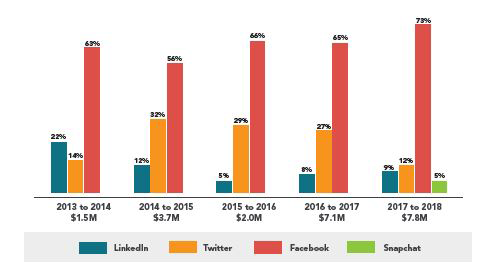
Image description of Figure 5: Social Media Placement with Agency of Record—A 5-year perspective
This vertical bar chart shows the amount of Government of Canada advertising expenditures attributed to Social media, over a 5-year period, from the fiscal year 2013 to 2014 to fiscal year 2017 to 2018. The chart displays 3 social media categories: LinkedIn, Twitter, Facebook, Snapchat.
| Fiscal year | Snapchat | Total social media expenditures | |||
|---|---|---|---|---|---|
| 2013 to 2014 | 22% | 14% | 63% | n/a | $1.5 million |
| 2014 to 2015 | 12% | 32% | 56% | n/a | $3.7 million |
| 2015 to 2016 | 5% | 29% | 66% | n/a | $2.0 million |
| 2016 to 2017 | 8% | 27% | 65% | n/a | $7.1 million |
| 2017 to 2018 | 9% | 12% | 73% | 5% | $7.8 million |
Advertising for results: Spotlight on 3 campaigns
Canada Revenue agency campaign: Canada caregiver credit

Description of Canada Revenue agency campaign: Canada caregiver credit
The Canada Revenue agency campaign highlighted the Canada caregiver credit. The objective was to educate Canadians about the new credit which provides support to caregivers whether or not they live with dependants.
Results:
- click through rate for search engine marketing 6.42% (2% industry benchmark)
- 18,951,498 impressions on display ads
- 260,912 visits to webpage between February 19 and March 31
Parks Canada campaign: Free Admission

Description of Parks Canada campaign: Free Admission
Parks Canada’s national awareness campaign encouraged Canadians to discover their national parks, national marine conservation areas and national historic sites, as well as to connect with nature and help protect these places.
Results:
- increased visits to Parks Canada locations by 8.8%
- 48.9% increase in website sessions compared to 2016
- achieved 325,000,000 media impressions across all platforms
Innovation, Science and Economic Development campaign: Science, technology, engineering and mathematics
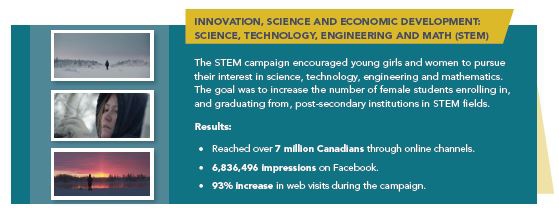
Description of Innovation, Science and Economic Development campaign: Science, technology, engineering and mathematicn
The science, technology, engineering and mathematics (STEM) campaign encouraged young girls and women to pursue their interest in science, technology, engineering and mathematics. The goal was to increase the number of female students enrolling in, and graduating from, post-secondary institutions in STEM fields.
Results:
- reached over 7 million Canadians through online channels
- 6,836,496 impressions on Facebook
- 93% increase in web visits during the campaign
Official languages
In 2017, PSPC completed independent research that showed that most Canadians in official language minority communities prefer to receive government information via the internet and television, like the majority of Canadians. One of the benefits of the internet is that, wherever you live in Canada, you can find the government information that you need, in the language of your choice, when you want to look for it, from your phone, mobile device, at work or at home.
But making sure that Canadians receive information from the Government of Canada in the official language they prefer is challenging in today’s digital communications environment. Some Francophones set the language preferences on their devices to English while some Anglo-phones set them to French. This means that they receive advertisements in the preference set on their devices rather than their mother tongue.
PSPC developed a solution to this problem by designing a unique feature for digital display advertisements. It allows recipients to “toggle” between English and French so a francophone whose preferences are set to English can use this feature to easily “toggle” to a French version of the ad and to related French websites and vice-versa. The bilingual toggle is now being used in Government of Canada digital display ad campaigns. In addition, we are able to track the number of Canadians who toggle from one language to the other.

Description of Government of Canada campaign
What can government do for your business?
In the top right hand corner is the French toggle, allowing viewers to switch between the English ad and the equivalent French ad.
Reaching official language minority communities
The Government of Canada uses a mix of media to reach Canadians in the language of their choice. Media types include national television stations (for example, Canadian Broadcasting Corporation, Radio-Canada) those that broadcast special events like the Olympics (for example, The Sports Network, Réseau des sports) and the 124 official language radio stations and print newspapers when a campaign calls for radio and print (In 2017 to 2018, investment in print publications was $28,913 and in radio was $73,587).
The most recent Canadian Census from 2016 indicated that while the number of French speakers outside Quebec had dropped to 3.8% since 2011, the national percentage of French speakers across Canada was around 23% including those in the province of Quebec. To ensure that Government advertising reaches Canadians in both official languages, PSPC requires the AOR to plan internet campaigns with 75% English sites and 25% French ones.
English and French spending: Share of spending by media type
On average, official language spending in 2017 to 2018 is approximately 80% English to 20% French, which aligns with 2012 Census data on population profiles. This population percentage rose in Census 2016 and as a result PSPC has adjusted the official language digital media levels for purchases starting in 2018 to 2019.
While federal departments are responsible for managing their advertising campaigns, PSPC works with them to ensure that they are aware of their responsibilities with respect to the Official Languages Act.
| Media type | English | French | Total | ||
|---|---|---|---|---|---|
| $ | % | $ | % | ||
| Cinema | $1,757,868 | 87% | $273,828 | 13% | $2,031,696 |
| Dailies | $63,940 | 77% | $19,432 | 23% | $83,372 |
| Weeklies | $23,052 | 36% | $41,414 | 54% | $64,467 |
| Magazines | $176,919 | 86% | $29,241 | 14% | $206,160 |
| Out-of-home | $1,544,173 | 72% | $601,266 | 28% | $2,145,438 |
| Radio | $234,411 | 80% | $60,403 | 20% | $294,814 |
| Television | $3,412,391 | 81% | $802,231 | 19% | $4,214,623 |
| Internet display | $5,500,309 | 78% | $1,515,120 | 22% | $7,015,429 |
| Internet social media | $5,975,132 | 79% | $1,541,068 | 21% | $7,516,200 |
| Internet search engine marketing | $1,715,238 | 83% | $351,304 | 17% | $2,066,542 |
| Internet real-time bidding | $880,708 | 82% | $194,151 | 18% | $1,074,858 |
| $26,713,598 | |||||
Reaching all Canadians
Immigration, Refugees and Citizenship Canada campaign : Services to newcomers

Description of Immigration, Refugees and Citizenship Canada campaign : Services to newcomers
This campaign aimed to increased awareness about programs and services offered to help newcomers integrate and succeed in Canada.
The ultimate goal was to increase use of Government of Canada-funded settlement services by newcomers so as to improve overall settlement outcomes.
Results:
- search engine marketing had 10,356,686 impressions
- 2.33% click through rate on Facebook
- 10.1% increase in use of newcomer services while the campaign was in market
Health Canada campaign: Jordan's principle

Description of Health Canada campaign: Jordan's principle
This campaign was to inform First Nations communities about Jordan's Principle, which makes sure all First Nations children can access the products, services and supports they need, when they need them. It can help with a wide range of health, social and educational needs. The main objective was to increase awareness about Jordan's Principle among First Nations families, health providers and key stakeholders.
Results:
- over 4,700,000 impressions across all media types
- 43.08% view through rate on YouTube
- doubled website visits
Ethnic and Indigenous languages
Communications, including advertising, is central to the Government of Canada’s work and contributes directly to the Canadian public’s trust in their government. The government communicates with the public in ethnic and Indigenous communities to inform them of policies, programs, services and initiatives, and of Canadians’ rights and responsibilities under the law.
Table 3 indicates the types of media that were used to reach these target groups.
| Media | Ethnic | Indigenous |
|---|---|---|
| Radio | $4,093 | $93,009 |
| Television | $22,144 | $234,175 |
| $203,981 | $12,217 | |
| Internet | $49,626 | $26,441 |
Advertising services supplier: A private sector supplier selected through a competitive process to provide a government institution with advertising services, such as strategic planning, creative and production services in support of an advertising initiative.
International media spending
Advertising spending through the AOR Footnote 5 outside of Canada was limited to 1 department in 2017 to 2018 was limited to 1 department represented about 1.5% of the total amount spent by the government on advertising. The Electronic Travel Authorization (eTA) and Express Entry campaigns were led by Immigration, Refugees and Citizenship Canada and cost $404,431 excluding production.
Since 2016, over 3.2 million visitors each year need an eTA prior to boarding a flight to travel to or transit through Canada. Citizens from over 50 countries are affected, and the eTA campaign was designed to complement other government communications activities to generate awareness of the eTA travel requirement and inform affected travelers from visa-exempt countries.
The Express Entry campaign was launched online to international target groups to inform them of changes to the immigration system, including additional points for candidates with strong French language skills. The international digital campaign targeted prospective French-speaking newcomers as candidates who would contribute to the growth, vitality and prosperity of Franco- phone minority communities across Canada.
| Department | Campaigns | Media | Amount |
|---|---|---|---|
| Immigration, Refugees and Citizenship Canada via the online advertising unit (PSPC) | eTA and express entry | Search engine marketing | $192,201 |
| Social media | $212,230 | ||
| Total | $404,431 | ||
Government of Canada advertising expenditures
The following section of the report contains the advertising expenditures from Government of Canada institutions under schedules I, I.I and II of the Financial Administration Act. The amount spent by each institution varies based on the number and size of each campaign, the creative approach and media types.
Figure 6 shows the top 10 Government of Canada advertisers who are responsible for 59% of the $39.2M spent this year.
Figure 6: Top 10 Government of Canada advertisers
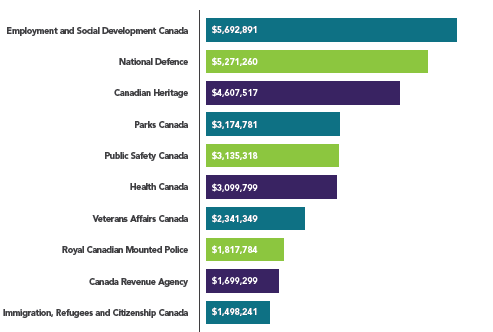
Note: Totals include media and production and funding from the Government of Canada digital advertising unit within PSPC.
Image description for figure 6: The top 10 Government of Canada advertisers
This horizontal bar graph shows the advertising expenditures, from highest to lowest, of the top 10 Government of Canada advertisers during the fiscal year 2017 to 2018.
- Employment and Social Development Canada: $5,692,891
- National Defence: $5,271,260
- Canadian Heritage: $4,607,517
- Parks Canada: $3,174,781
- Public Safety Canada: $3,135,318
- Health Canada: $3,099,799
- Veterans Affairs Canada: $2,341,349
- Royal Canadian Mounted Police: $1,817,784
- Canada Revenue Agency: $1,699,299
- Immigration, Refugees and Citizenship Canada: $1,498,241
Note: Totals include media and production and funding from the Government of Canada Digital Advertising Unit within PSPC.
Advertising expenditures by institution
| Institution | Advertising Media purchased by the Agency of Record (includes production) |
Advertising Media purchased directly by institutions |
Digital Advertising table 2 note 1 media purchased through AOR (includes production) |
Total |
|---|---|---|---|---|
| Administrative Tribunal Support Service of Canada | $0.00 | $1,408.62 | n/a | $1,408.62 |
| Agriculture and Agri-Food Canada | $203,723.52 | $250.00 | n/a | $203,973.52 |
| Atlantic Canada opportunities agency | $0.00 | $21,100.00 | n/a | $21,100.00 |
| Canada Border Services agency | $191,979.67 | $32,287.26 | n/a | $224,266.93 |
| Canada Economic Development for Quebec Regions | $0.00 | $7,787.29 | n/a | $7,787.29 |
| Canada Revenue agency | $1,067,510.42 | $23,335.33 | $608,453.11 | $1,699,298.86 |
| Canadian Centre for Occupational Health and Safety | $0.00 | $23,128.17 | $96,421.56 | $119,549.73 |
| Canadian Environmental Assessment agency | $0.00 | $122,362.12 | n/a | $122,362.12 |
| Canadian Food Inspection agency | $89,797.71 | $39,492.68 | n/a | $129,290.39 |
| Canadian Grain Commission | $0.00 | $57,954.94 | n/a | $57,954.94 |
| Canadian Heritage | $4,345,088.53 | $30,449.97 | $231,978.58 | $4,607,517.08 |
| Canadian Institutes of Health Research | $0.00 | $5,976.54 | n/a | $5,976.54 |
| Canadian Northern Economic Development agency | $0.00 | $65,682.06 | n/a | $65,682.06 |
| Canadian Nuclear Safety Commission | $0.00 | $143,604.35 | n/a | $143,604.35 |
| Canadian Radio-television and Telecommunications Commission | $101,727.50 | $13,064.62 | n/a | $114,792.12 |
| Canadian Security Intelligence Service | Has not reported | Has not reported | Has not reported | Has not reported |
| Canadian Transportation agency | $77,889.28 | $0.00 | n/a | $77,889.28 |
| Civilian Review and Complaints Commission for the Royal Canadian Mounted Police | $0.00 | $2,262.29 | n/a | $2,262.29 |
| Communications Security Establishment Canada | $269,625.02 | $14,294.53 | n/a | $283,919.55 |
| Correctional Service Canada | $0.00 | $14,441.75 | n/a | $14,441.75 |
| Courts Administration Services | $0.00 | $4,420.18 | n/a | $4,420.18 |
| Department of Finance Canada | $0.00 | $0.00 | $47,234.42 | $47,234.42 |
| Department of Justice Canada | $0.00 | $0.00 | $24,417.75 | $24,417.75 |
| Employment and Social Development Canada | $5,645,634.99 | $47,255.52 | n/a | $5,692,890.51 |
| Environment and Climate Change Canada | $25,575.00 | $84,018.08 | n/a | $109,593.08 |
| Farm Products Council of Canada | $0.00 | $46,023.28 | n/a | $46,023.28 |
| Financial Consumer agency of Canada | $870,892.54 | $0.00 | n/a | $870,892.54 |
| Fisheries and Oceans Canada | $0.00 | $106,065.07 | $91,234.22 | $197,299.29 |
| Global Affairs Canada | $244,216.79 | $264,528.73 | n/a | $508,745.52 |
| Health Canada | $3,062,580.61 | $37,217.89 | n/a | $3,099,798.50 |
| Immigration and Refugee Board of Canada | $0.00 | $1,637.46 | n/a | $1,637.46 |
| Immigration, Refugees and Citizenship Canada | $1,405,525.33 | $0.00 | $92,715.36 | $1,498,240.69 |
| Indigenous and Northern Affairs Canada | $0.00 | $78,991.31 | n/a | $78,991.31 |
| Innovation, Science and Economic Development Canada | $546,408.96 | $0.00 | $369,067.79 | $915,476.75 |
| Library and Archives Canada | $0.00 | $20,158.51 | n/a | $20,158.51 |
| National Defence | $5,050,110.05 | $221,150.30 | n/a | $5,271,260.35 |
| National Energy Board | $0.00 | $11,911.50 | n/a | $11,911.50 |
| National Film Board | $74,816.33 | $341,182.63 | n/a | $415,998.96 |
| National Research Council Canada | $0.00 | $93,586.07 | n/a | $93,586.07 |
| Office of the Commissioner for Federal Judicial Affairs Canada | $0.00 | $2,594.00 | n/a | $2,594.00 |
| Natural Resources Canada | $0.00 | $57,156.78 | n/a | $57,156.78 |
| Office of the Secretary to the Governor General | $0.00 | $158,345.59 | n/a | $158,345.59 |
| Office of the Superintendent of Financial Institutions | $0.00 | $6,623.66 | n/a | $6,623.66 |
| Parks Canada | $2,570,806.09 | $603,974.57 | n/a | $3,174,780.66 |
| Public Health agency of Canada | $861,923.74 | $0.00 | n/a | $861,923.74 |
| Public Prosecution Service of Canada | $0.00 | $780.00 | n/a | $780.00 |
| Public Safety Canada | $2,622,743.60 | $0.00 | $512,574.52 | $3,135,318.12 |
| Public Service Commission of Canada | $0.00 | $12,583.22 | n/a | $12,583.22 |
| Public Services and Procurement Canada | $187,211.80 | $380,062.96 | n/a | $567,274.76 |
| Royal Canadian Mounted Police | $1,807,138.35 | $10,645.48 | n/a | $1,817,783.83 |
| Shared Services Canada | $13,478.10 | $0.00 | n/a | $13,478.10 |
| Statistics Canada | $0.00 | $1,877.25 | n/a | $1,877.25 |
| The National Battlefields Commission | $0.00 | $64,619.70 | n/a | $64,619.70 |
| Transport Canada | $58,728.15 | $31,995.12 | $54,009.00 | $144,732.27 |
| Veterans Affairs Canada | $2,181,123.52 | $20,896.00 | $139,329.23 | $2,341,348.75 |
| Total | $33,576,255.60 | $3,329,183.38 | $2,267,435.54 | $39,172,874.52 |
Table 2 Notes
|
||||
Major campaigns by institution exceeding $500,000
| Campaign | Creative agency | Production | Media | Total |
|---|---|---|---|---|
| Canada Revenue agency | ||||
| Canada caregiver credit | KBS+P Canada Inc. | $259,278.91 | $764,997.76 | $1,024,276.67 |
| National Defence | ||||
| Ambitions phase III | Ogilvy Montréal Inc. | $166,216.42 | $382,967.62 | $551,204.04 |
| Overarching recruitment campaign | Ogilvy Montréal Inc. | $259,872.47 | $1,978,952.35 | $2,238,824.82 |
| Women and diversity campaign | Ogilvy Montréal Inc. | $110,335.64 | $444,816.19 | $555,151.83 |
| Priority occupations job posting campaign | Ogilvy Montréal Inc. | $117,727.63 | $552,634.29 | $670,361.92 |
| Financial Consumer agency of Canada | ||||
| Take charge of your finances | Compass Communications Inc. | $103,712.25 | $767,160.29 | $870,872.54 |
| Health Canada | ||||
| Prescription drug abuse | Ogilvy Montréal Inc. | $245,106.37 | $614,414.64 | $859,521.01 |
| Cannabis public education campaign—phase one | Manifest Communications Inc. | $836,635.96 | $545,948.53 | $1,382,584.48 |
| Immigration, Refugees and Citizenship Canada | ||||
| Services to newcomers | n/a | $14,066.25 | $758,303.11 | $772,268.36 |
| Innovation, Science and Economic Development Canada | ||||
| STEM phase II | Manifest Communications Inc. | $187,308.00 | $431,887.05 | $619,195.05 |
| Employment and Social Development Canada | ||||
| Education and skills—Youth | Manifest Communications Inc. | $1,038,362.06 | $4,607,272.93 | $5,645,634.99 |
| Royal Canadian Mounted Police | ||||
| Police officer recruitment | Ogilvy Montréal Inc. | $184,800.69 | $1,622,337.66 | $1,807,138.35 |
| Parks Canada | ||||
| National Advertising Campaign | Ogilvy Montréal Inc. | $626,979.81 | $1,739,133.83 | $2,366,113.64 |
| Public Safety Canada | ||||
| Drug-impaired Driving | Banfield-Seguin Ltd. | $552,801.67 | $1,888,771.37 | $2,441,573.04 |
| Veterans Affairs Canada | ||||
| 2017 Commemoration and services to veterans | n/a | $333,367.73 | $1,391,498.61 | $1,724,866.34 |
| Canadian Heritage | ||||
| Canada 150 | Tank Inc. | $2,177,708.30 | $2,167,380.23 | $4,345,088.53 |
Appendix I: Government of Canada advertising process—Who does what
The Government of Canada has an obligation to inform Canadians about its policies, programs and services, about their legal rights, and to alert them to environmental, public health and safety issues. Advertising is one way the Government does this. A rigorous process, involving many organizations, is in place to ensure that advertising activities align to government priorities, themes and objectives, comply with policies, procedures and legislation, and meet the information needs of Canadians. Government of Canada (GC) advertising is conducted according to the Policy on Communications and Federal Identity. The roles of the organizations involved in the process is described below.
Institutions
Departments and other portions of the federal public administration operating under Schedules I, I.1 and II of the Financial Administration Act develop their advertising plans based on their organizations and Government of Canada’s priorities, and work with the Privy Council Office to obtain Cabinet approval. They work with Public Services and Procurement Canada (PSPC) to contract an advertising agency to provide a creative strategy and materials, and the Agency of Record to provide a media strategy and plans. Institutions are responsible for managing all aspects of their advertising activities, ensuring that their campaigns reach their target audiences with the appropriate message at the correct time, using media appropriate to reach their audiences. Along with this, they are responsible to ensure that all communications adheres to the Official Languages Act. And they are responsible for evaluating the effectiveness of their advertising efforts. At the end of the fiscal year they report their yearly spending to PSPC.
Privy council office
PCO sets broad government communications themes that reflect government priorities, as determined by the Prime Minister, Cabinet, Cabinet committees and the Clerk of the Privy Council. Institutions submit their advertising plans to PCO which works with the Prime Minister’s Office to develop the Government of Canada’s annual advertising plan. Once approved by Cabinet, PCO prepares relevant documentation so that institutions receive funding from the central advertising fund (departments can also fund their advertising using their own funds). PCO provides oversight of advertising government-wide, coordinates advertising activities to ensure that the overall budget levels are respected, and ensures that results collected help inform future campaign development.
Treasury Board of Canada Secretariat
TBS issues administrative policies, including the Policy on Communications and Federal Identity, which governs communications activities, including advertising. It manages the Treasury Board submission process to secure advertising funding for departments. The renewed policy, released in May 2016, aligns Government of Canada communications practices with today’s digital environment, and includes a requirement that all communications products and activities, including advertising, be non-partisan. All advertising campaigns with budgets over $500,000 must undergo a mandatory independent external review to ensure that they are non-partisan. Review results are posted on Canada.ca.
Public Services and Procurement Canada
Three PSPC Directorates are involved in GC advertising:
- Advertising Coordination and Partnerships Directorate (ACPD): ACPD provides planning and coordination advice to GC institutions related to relevant policies, procedures and legislation; offers training to the GC advertising community to ensure their skills remain up-to-date; manages the GC Agency of Record (that plans and buys media on behalf of the GC) and the Advertising Technology Provider (that serves GC display ad materials); and reports on GC advertising activities in the Annual Report on Advertising
- Communications Procurement Directorate (CPD): CPD is the sole contracting authority for the GC as relates to advertising and public opinion contracts. It manages the procurement process and works with ACPD to create relevant procurement tools and select suppliers to provide advertising services to the GC
- Public Opinion Research Directorate (PORD): PORD advises institutions about public opinion research, compliance with relevant acts and policies, and research methodologies. It reviews research projects related to pre- and post-campaign testing for advertising campaigns (a process that is mandatory for campaigns with media buys over $1M)
Appendix II: Government of Canada advertising suppliers
| Contract type | Supplier |
|---|---|
| Standing offers up to $200,000 | Agency 59 Ltd |
| Brad Inc. | |
| Compass Communications Inc. | |
| kbs+p Canada | |
| Maclaren McCann Canada Inc. | |
| Manifest Communications Inc. | |
| Ogilvy Montréal Inc. | |
| Target Marketing & Communications Inc. | |
| Aboriginal set-aside Standing offers up to $350,000 |
Earthlore Communications |
| Supply arrangements greater than $200,000 | Acart Communications Inc. |
| Acart Communication in joint venture with Pub Point Com | |
| Agency 59 Ltd. | |
| Brown Communications Group Inc. in joint venture with David Stanger & Associates | |
| Compass Communications Inc. | |
| kbs+p Canada Inc. | |
| Maclaren McCann Canada Inc. | |
| Manifest Communications Inc. | |
| Marketel/ McCann Erickson | |
| M5 Marketing Communications Ltd. | |
| Mediaplus Advertising | |
| Ogilvy & Mather Canada | |
| Ogilvy Montréal Inc. | |
| Tank | |
| Target Marketing & Communications Inc. | |
| Juniper Park Communications ULC in joint venture with Headspace Marekting Inc, Wills & Co. Media Strategies Inc. | |
| Marshall Fenn Communications Ltd. | |
| Contracts through campaign specific requests for approval on BuyandSell.gc.ca | Acart Communications Inc. |
| Ogilvy Montréal Inc. | |
| Maclaren McCann Canada Inc. | |
| Banfield-Seguin Ltd. |
Appendix III: Government of Canada advertising glossary
- Advertising
- Any message conveyed in Canada or abroad and paid for by the government for placement in media, including but not limited to newspapers, television, radio, cinema, billboards and other out-of-home media, mobile devices, the internet, and any other digital medium.
- Advertising activities
- Activities relating to the production and placement of advertising. These activities include campaign planning, creative development, pre-testing, production, media planning, placement of advertising and evaluation.
- Advertising services supplier
- A private sector supplier selected through a competitive process to provide a government institution with advertising services, such as strategic planning, creative and production services in support of an advertising initiative.
- Advertising technology provider (ATP)
- A private sector supplier, selected through a competitive process, which maintains various platforms to serve, track and report on federal digital advertisements, including an ad server to host and serve display advertising, a demand-side platform for programmatic advertising buys, and a data management platform with standardized information on campaign performance and results.
- Agency of Record (AOR)
- A private sector supplier, selected through a competitive process, which plans, negotiates, consolidates, purchases and verifies advertising media space and time for government advertising.
- Digital display advertising
- Advertising in different text, image and audio formats, such as banner or big box ads published on a website for viewing by site visitors.
- Media buy or placement
- The purchase of advertising space and time from a media outlet, such as television, radio, digital, newspaper, magazine, website, cinema, out-of-home, etc.
- Out-of-home
- Advertising media to which audiences are exposed outside the home such as mall posters, billboards, bus and transit-shelter advertisements, digital screens and kiosks, etc.
- Non-partisan communications
- In the context of all Government of Canada communications products and activities, non-partisan is defined as follows:
- it is objective, factual and explanatory
- it is free from political party slogans, images, identifiers; bias; designation; or affiliation
- the primary colour associated with the governing party is not used in a dominant way, unless an item is commonly depicted in that colour
- advertising is devoid of any name, voice or image of a minister, Member of Parliament or senator
- Programmatic (Real time bidding)
- A data-driven programmatic buying model allowing advertisers or their agencies to bid on digital media space (display, video, mobile, social, etc.) in real-time, at the impression level (source: Interactive Advertising Bureau of Canada).
- Promoted posts
- Paid advertising option on social media platforms to increase the likelihood of an institution’s post being seen by a key audience.
- Public notices
- Public notices, such as those providing information about requests for tenders, public hearings, offers of employment, and changes to business hours and addresses are a form of advertising. Public notices often deal with routine regional or local matters, and institutions have the option to purchase the media for public notices themselves or to use the services of the Government of Canada’s Agency of Record.
- Request for proposal (RFP)
- A formal government document, posted on buyandsell.gc.ca, through which advertising services suppliers are invited to submit proposals for creative advertising work on complex thematic and multi-component projects usually spanning more than 1 year. Proposals are evaluated according to criteria detailed in each RFP. Contracts are awarded through a competitive process in which selection is based on a combination of technical score and price offering best value.
- Search engine marketing
- A form of advertising used to promote websites and attract visitors by increasing their visibility in search engine results, on search engine platforms.
- Social media
- Interactive web-based platforms that encourage users to collaborate, create, generate and distribute content and to customize applications.
- Standing offer
- An arrangement in which advertising services suppliers qualify from a pool of pre-screened advertising services suppliers to provide the government with goods and services at pre-arranged prices, under set terms and conditions, and for specific periods of time on an “as requested” basis. A standing offer is not a contract.
- Supply arrangement
- A method of supply where bids are requested from a pool of pre-screened advertising services suppliers. A supply arrangement is not a contract.
- Website buyandsell.gc.ca
- The electronic-tendering system used by the Government of Canada to post searchable procurement notices and bid-solicitation documents for access by suppliers and contracting officers. For more information, please see buyandsell.gc.ca.
Appendix IV: Government of Canada advertising resources
- Government of Canada advertising
- Advertising fund allocations
- Government of Canada advertising process
- Agency of record, standing offers and supply arrangements for Government of Canada advertising services
- Policy on Communications and Federal Identity
- Official Languages Act (related to Government of Canada Advertising)
- Past Government of Canada advertising annual reports
- Date modified:
